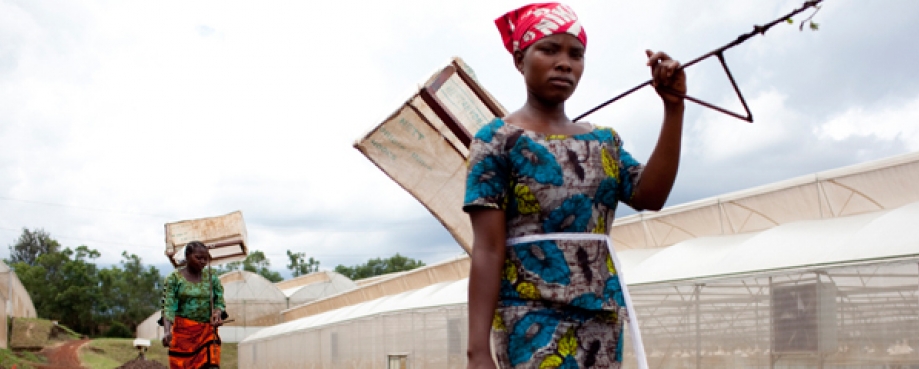
This Living Wage Week we reflect on why so many people around the world are still trapped in poverty despite being in work. Some of the answers emerged from the living wage session at our recent conference and from a new briefing by ETI member Oxfam.
Earlier this month 330 people from companies, trade unions, government and NGOs gathered in central London to consider how far business has come in upholding human rights around the world. The ETI and Innovation Forum Ethical Trade and Human Rights Forum covered a wide range of topics – including a group session on Strategies to promote a living wage and the business case for doing so. The session was moderated by Rachel Wilshaw, of Oxfam GB.
Rachel got the audience of about 75 on their feet and then asked them to stay standing if they represented a company. About two-thirds of them stayed standing. She then asked “Does your company have a policy that includes a commitment to a living wage such as the ETI Base Code?”
All but two stayed proudly standing. Next she asked if the issue of a living wage had gone up the agenda in their companies in the last two years. There was a flurry of people sitting down and 35 remained standing.
As she fired off the subsequent questions more and more sat down; Have you carried out research on where in your supply chain there is a high risk of low wages, and you have the leverage to do something? Has your company got a corporate plan or signed up to an initiative that includes raising low wages towards a living wage? Does it include tackling root causes of low wages at a systemic level? Does it include an active role for trade unions? Is it published? And by the time she asked the last question, “Have wages in your key supply base risen since your plan was published (other than via an increase in minimum wage)?” only two people remained standing.
The exercise graphically demonstrated the reality that while most companies are now very aware of the imperative to tackle the issue of low wages, very few have yet reached the stage of being able to demonstrate progress in this area. Little wonder, then, that so many millions of people around the world are in work, but trapped in poverty.
Oxfam has recently published a briefing entitled In work, but trapped in poverty. Originally drafted to provide evidence to feed into ETI’s living wage conference in April 2015, it summarises recent research Oxfam has conducted on wages and working conditions in food and garment supply chains in Morocco, Malawi, Kenya, Vietnam and Myanmar. Most of the studies are about sectors in which ETI members are active. The briefing brings readers up to date with progress since publication, gives an insight into how positive change has happened and outlines what still needs to change for workers to enjoy secure work on a living wage.
After summarising the struggles faced by workers – mostly women – in each of these industries to survive on the wages they receive, it concludes that “Fifteen years of corporate codes have only made a dent in these serious issues. Audit-based compliance has had its day. It’s time for a new approach that recognises the systemic nature of serious violations of people’s rights at work…With active support from governments, companies and consumers, we need to create a world where working in a profitable value chain becomes a genuine route out of poverty… Secure jobs on a living wage must become the norm, not the exception.”
The need for systemic change was also the strong conclusion of the ETI Living Wage conference, and is the central thesis of the joint ETI[1] briefing launched at that conference: Living Wages in Global Supply Chains: A New Agenda for Business
The three key themes that emerged from the Ethical Trade and Human Rights Forum have particular significance for living wages; the necessity of talking to and listening to workers (ideally through elected representatives), the severe limitations of auditing alone to tackle human rights abuses and the effectiveness of collaboration in making progress in this highly complex area. Freedom of association and collective bargaining, when practised freely, fairly and in good faith, are clearly the best way to ensure that workers enjoy sustained living wages. The cat and mouse games played by auditors and employers operating double and sometimes triple bookkeeping systems, and the practice of monitoring only to minimum wages, clearly demonstrate the limitations of auditing in ensuring living wages. And, clearly, collaborative efforts such as those of a group of garment companies, predominantly ETI members working with a global trade union federation such as IndustriALL, have the strongest hope of success and sustainability in raising wages in a whole industry.
[1] Published jointly by ETI Denmark, Norway and UK
